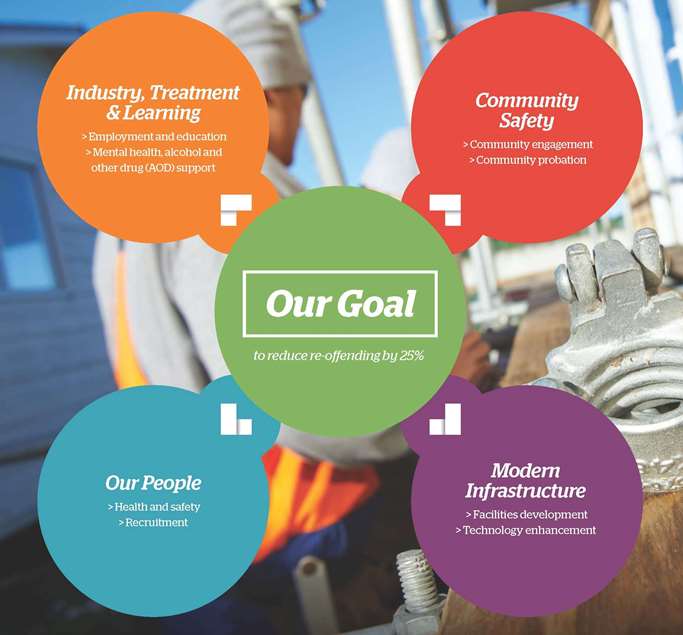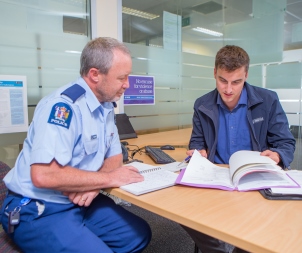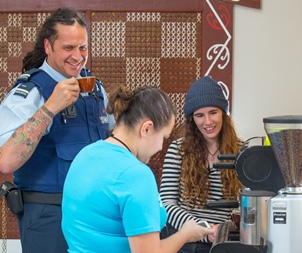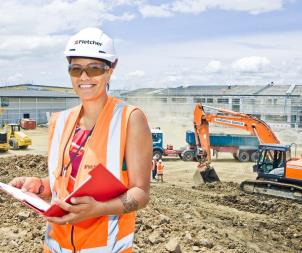Change Lives Shape Futures Strategic Plan 2016-2017
Change Lives Shape Futures is the Department of Corrections’ strategic plan for 2016-2017.
One goal, four priorities and eight action areas
Our vision: Creating lasting change by breaking the cycle of re-offending.
Public safety is our bottom line.

Introduction by Chief Executive Ray Smith
As I complete my sixth year as Chief Executive of Corrections, it is with an even stronger sense of purpose that I lay out our key priorities for the year ahead.
Each year has brought new challenges and changes in community expectations, along with opportunities to be seized, and each year we have stepped up to meet these challenges and improved the way we work.
Today Corrections is a resilient and motivated department organised to get things done. The alignment of our people, and those we partner with, could not be stronger. Our goal of reducing re-offending brings us together and drives us year upon year to refocus our priorities and make the communities we live in safer places.
In the face of a rising prison population we will invest in high quality facilities and increase staffing levels to match. We will focus on providing mental health support, counselling services, drug and alcohol rehabilitation and education. Critically, we will engage communities, iwi, employers, providers, interest groups, media and our stakeholders in the work we do to change lives and shape futures.
 Our People
Our People
We want you to go home from work each day the same way you arrived – safely. We also want to encourage more people to try out their skills and talents and join the Corrections team.
Health and safety - Each one of us has to make safety a priority, taking personal responsibility to ensure we deliver on our safety strategy to keep “Everyone safe every day”.
The ongoing redevelopment of our Community Corrections environment is critical to realise our safety ambitions, as is the investment in training, protective equipment and technology in our prisons.
Recruitment - To respond to the demand for corrections services we are embarking on a major recruitment programme offering training and careers to Kiwis who might not have thought about how their unique talents could change the lives and shape the futures of offenders.
We will also be targeting the recruitment of high performing corrections staff in international jurisdictions who are seeking a lifestyle change, or are keen on returning to New Zealand.
Community Safety
 Three-quarters of all offenders are living in the community right now, and almost everyone in prison today will return to the community someday. In everything we do our first thoughts must be how we can make things safer.
Three-quarters of all offenders are living in the community right now, and almost everyone in prison today will return to the community someday. In everything we do our first thoughts must be how we can make things safer.
Community engagement - We will engage New Zealanders about the work we do to keep everyone safe. We will reach out to those who can lend a helping hand. Expect to see us in more places and looking for more opportunities to support local communities. If there’s a special project that needs labour and it’s safe, expect us to have a community work team there helping out.
Community probation - We will strengthen our work with the Police and other agencies in the management of high risk people, including having staff focused on finding suitable accommodation for our most challenging offenders. We also expect to see new legislation that introduces alcohol and drug testing of high risk offenders and the child sex offender register.
We will continue to run our successful driver licence education programme for offenders who have been prosecuted for driving offences.
Industry, Treatment & Learning (ITL)
 19,000 people will spend time in prison in the next year, 55% will have been receiving a welfare benefit, 36% will have a mental health condition and 47% will have drug or alcohol dependency. Nearly 65% of prisoners haven’t achieved NCEA level 1 in literacy and numeracy. This is why we’re transforming prisons into places of industry, treatment and learning.
19,000 people will spend time in prison in the next year, 55% will have been receiving a welfare benefit, 36% will have a mental health condition and 47% will have drug or alcohol dependency. Nearly 65% of prisoners haven’t achieved NCEA level 1 in literacy and numeracy. This is why we’re transforming prisons into places of industry, treatment and learning.
Employment and education - RR25% Boost will continue to lift participation rates in activities that can change lives. Each prison’s ITL plan will drive the scheduling of available activities and increase the delivery of more learning opportunities.
Access to basic literacy and numeracy tuition, online and distance learning will support offenders’ ongoing education. When matched with qualifications gained in trades through our NZQA approved employment programmes, we are readying prisoners for a life on the outside.
Mental health, alcohol and other drug (AOD) support - Corrections will purchase $14m worth of mental health services including packages of support, counselling, post release family
services and supported accommodation.
7,500 offenders will access AOD aftercare services over the next
two years with 14 AOD aftercare workers already up and running in
our prisons.
Modern Infrastructure
 Our physical infrastructure is the backbone that allows us to get the job done. Property, technology, security and transportation systems must keep pace with demand and change.
Our physical infrastructure is the backbone that allows us to get the job done. Property, technology, security and transportation systems must keep pace with demand and change.
Facilities development - Phase one of the prison capacity programme will deliver 270 more prison beds at four prisons by December 2017.
The Christchurch Justice and Emergency Services Precinct will open in early 2017, providing the benefits of a joined-up justice sector.
Capital developments will see 70% of Community Corrections facilities upgraded and a new maximum security facility at Auckland Prison open by 2018.
Technology enhancement - The biggest user enhancement to Integrated Offender Management System since its inception will improve access to information for all staff through a modern user interface.
Following extensive testing, eight priority prison sites will have access to on body cameras.
More Community Corrections sites will have CCTV monitoring, controlled front door access, duress alarms and swipe card access to staff only areas to improve safety.
Reducing re-offending among Maori
Maori make up half of all offenders. Reducing this level of offending is one of the significant long term challenges we all face. Participation rates and achievement levels of Maori in programmes proven to address criminogenic needs are comparable to all offender groups. What stands out is the over-representation of Maori offenders who are gang affiliated, and/or serve shorter prison sentences – two areas where reducing re-offending is more challenging.
If you’re in a gang you’re almost twice as likely to re-offend, and often more seriously, no matter the level of help received in prison. That’s why we must challenge gang participation. If we can better support short serving prisoners and impact gang affiliation we can reduce Maori re-offending dramatically.
Me rapu tonu, me wewete mārire I ngā kōpaki, kia kitea ai te kai o roto
(We must search continually, unwrapping the coverings to reveal what's inside)

